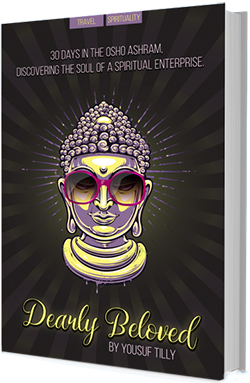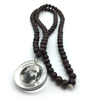Dearly Beloved

A review by Chinmaya on Yousuf Tilly’s book, subtitled ’30 Days in the Osho Ashram, Discovering the Soul of a Spiritual Enterprise’.
This irreverent romp through the current state of the Osho International Meditation Resort in Pune is undertaken by a subscriber to what he calls the “Netflix-generation of spirituality.” The author is delightfully full of non-seriousness (“Rajneesh was about the only Indian who didn’t shake his head the way the other billion do”) and describes himself as neither a critic of Rajneesh nor a sympathizer.
Quite why he ends up in the Resort’s Work as Meditation program is not clear, but amidst his sometimes rambling summarizing of spiritual matters we learn that he has seen why “9am in the ordinary world is all about power” and that he is “fascinated by integrity, or what lies behind the ugly mask stuck over our own faces.”
He is certainly excellent company as he navigates through his job at the Welcome Center, apparently known as the “armpit of the ashram” during his period there. His lack of identification with the place’s history is a refreshing perspective for someone like me, for whom every dusty, abandoned corner is a memory trigger for what once vibrantly went on in it. While his confrontations with the powers that be in Lao Tzu House leave him obviously bemused (“they only needed maroon policemen with maroon dogs to formally establish the ‘ego police’”) he still determines that he will leave the Welcome Center in better shape than he found it and in his likeable way, he apparently succeeds.
It is his relationships with his fellow workers on the Program that are most engaging to read about. So just who are these ‘neo-rebels’, inheritors of the ‘60s counter culture, that he identifies them as? “Love means sharing and collaboration,” is the clearest formula we get and this is contrasted with early sannyasins prioritizing of “love as freedom to be themselves.” To someone of my generation they come across paradoxically as both mature, for example in the way they can talk frankly over their relationship issues, and immature, in that their detachment appears to preclude the depths of devotion (that “almost-vanished continent” in Rashid Maxwell’s memorable phrase) that alone can make meditation more than just another “available product choice.”
At the end it is this lack of urgency that leaves me as the reader most alienated. We are treated to a potpourri of quotes from other gurus, and from books by researchers and disillusioned sannyasins, all carefully curated to leave us (like the ‘Wild Wild West’) mired in distracting details while Osho’s one consistent message to us – the state of witnessing – doesn’t even get a mention. Near the end the writer sums up his understanding of the teachings of the mystics thus: “…you will find that the source of the whole of existence is within you.” My question to him is: do you find this a challenge, or is it merely a good quote to post on your social media profile?
Clearly I must have found the book an invigorating read!
Review by Chinmaya
You can read the first chapter on Yousuf’s website: whiteteastudios.com
Available as Kindle or paperback from amazon.com – amazon.co.uk – amazon.de – amazon.in (Kindle)
Yousuf Tilly’s stories have ended up in books, cinema, and on cosmetics bottles. The tales vary, but always express the inner adventure found in the outer journey we call life. That road has led Yousuf to establish a creative agency, which has recently won the Dept. of Arts & Culture Publishing Award. Find his books and artworks on whiteteastudios.com and subscribe for updates on his latest works.
- Log in to post comments
- 10 views
